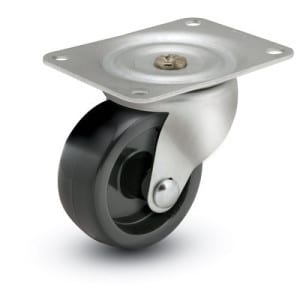 When you are looking to install casters onto a new or existing piece of equipment, such as a piece of furniture or a cart, you will naturally want to make sure you have the right casters for the job. You don’t want to buy and install a set of the cheapest casters you can find only to later find out that they are damaging your flooring or that they wear out too soon or fail when you need them most. But what questions should you be considering to ensure you have the right casters? Here are a few factors to consider when you are choosing a caster for your needs:
When you are looking to install casters onto a new or existing piece of equipment, such as a piece of furniture or a cart, you will naturally want to make sure you have the right casters for the job. You don’t want to buy and install a set of the cheapest casters you can find only to later find out that they are damaging your flooring or that they wear out too soon or fail when you need them most. But what questions should you be considering to ensure you have the right casters? Here are a few factors to consider when you are choosing a caster for your needs:
- What Application Do You Need Casters For?
What type of equipment will you install your casters on? This may sound like a simple question, but it is a critical one. This question will allow you to determine the total weight that will be applied to the casters so you know whether to choose light-duty, medium-duty or heavy-duty casters. This question also requires you to consider the environment in which you’ll use the casters. Will noise reduction be an important factor? Knowing the application details will help our experts to ensure that you are happy with the casters you buy.
- How Maneuverable Do You Need the Equipment to Be?
If your equipment is only moving in a straight line, such as heavy equipment that is moved out for cleaning and then back to the same space, then you might only need fixed casters. However, if you need better maneuverability, then a swivel caster may be the better option. You’ll also want to determine whether you’ll need swivel locks to have the option of moving an item in just a straight line. Being able to move something is the reason for installing casters, but how much flexibility you have in that movement is something you need to know.
- Do You Need to Fix the Casters in Place?
When you want an item to roll only some of the time, you’ll likely want to choose casters with brakes. When the brakes are in one position, you’ll be able to move the item easily. In another position, you won’t be able to move the item at all. There are several different types of brakes, so to determine which ones are right for your needs you’ll need to answer these questions:
- Do you want a friction brake that has a side mounted peddle that puts friction against the side of the wheel, or a tread lock that sits over the wheel and when engaged presses against the wheel tread?
- Do you want a total lock brake that locks the swivel and tread with one application?
- Do you want a brake that applies automatically such as a compression brake that locks into place when a load is applied or a decompression brake that locks when the load is removed?
Knowing your braking needs is crucial because adding this option later means changing the entire caster.
- What Wheels Do You Need?
This factor is split into two parts. The first is the material of the wheel that is dependent on where you will be using your caster. If you have a hard floor you will want a soft material caster such as a performa rubber or phenolic resin. A soft floor like carpeting will call for a metal wheel such as cast iron or steel. Using a caster in a rough surface such as outside or on stairs will demand a pneumatic wheel that can handle the shocks involved without transferring them to the load. On top of this is the consideration of how the temperature of use will affect the wheel, or if chemicals might impact the wheel material as well. For best performance, you’ll want to choose a wheel that was made for the surface on which you’ll be using them. The general rule of thumb is to use a wheel type that’s the opposite of your flooring. So hard wheels on soft flooring and soft wheels on hard flooring.
Secondly, the wheels dimensions are important to ensure that you get the best efficiency out of your casters. Conventional wisdom is that the larger the wheel, the better it rolls. This is true in the majority of cases, however, smaller wheels may be better for sensitive electronic equipment such as medical devices as this will help control the maneuverability of the casters and make the equipment easier to handle when it is being moved.
- How Will You Mount the Casters?
While this may not seem like a big deal, it can restrict which caster you end up choosing for your task. Many applications call for a stem mounted caster, but this can limit the load capacity of the caster you use. For this reason heavy-duty casters will use a plate mount to better secure the caster and distribute the load on a larger mounting area. Knowing your mounting preference can help to limit the choices when choosing from the large selection of casters available.
Who Can Help Me Choose the Right Caster?
Douglas Equipment! Our experts can help you determine the answers to these questions and help you select the casters that best meet your needs. Contact us today for assistance.




